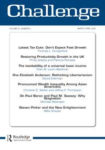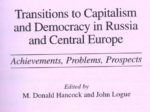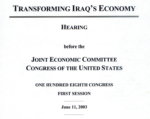These are the slides for a talk that focuses on the parallel inalienable rights arguments against the now-outlawed coverture marriage contract and the yet-to-be-outlawed employment contract.
Review-Essay on Elizabeth Anderson’s “Private Government” book
In her recent book Private Government [2017], Elizabeth Anderson makes a powerful but pragmatic case against the abuses experienced by employees in conventional corporations. The purpose of this review-essay is to contrast Anderson’s pragmatic critique of many abuses in the employment relation with a principled critique of the employment relationship itself.
Alexis de Tocqueville
Little-known proponents of workplace democracy:
Alexis de Tocqueville (1805-1859)
Straddler interview and video
This is the text and edited video of an interview with The Straddler in January 2016 entitled: Against the Renting of Persons.
My Congressional Testimony on Iraq in 2003
This is my testimony to the Joint Economic Committee of Congress in 2003 making recommendations after the U.S. conquered Iraq and had to figure out what to do. Today, it can be read as a negative-blueprint since the U.S. seems to have done just the opposite on every count.
Reply to Commentators on Labor Theory of Property
My paper on marginal productivity theory and the labor theory of property in the on-line journal Economic Thought drew commentaries for Jamie Morgan and Ted Burczak. After some back and forth on the journal’s discussion forum, this Reply to Commentators paper was published as an article in the journal.
Autonomy-Respecting Assistance
This paper, written upon request for the UNDP volume on Capacity for Development and in time for a big conference in Mexico on the topic, is a good brief summary of my then forthcoming book, Helping People Help Themselves –even if I was screwed out of a sizable honorarium by one of the editors, Malik.
Labor theory of property and Marginal productivity theory
This is a reprint from the journal Economic Thought of a paper on the labor theory of property and the neoclassial theory of marginal productivity.







